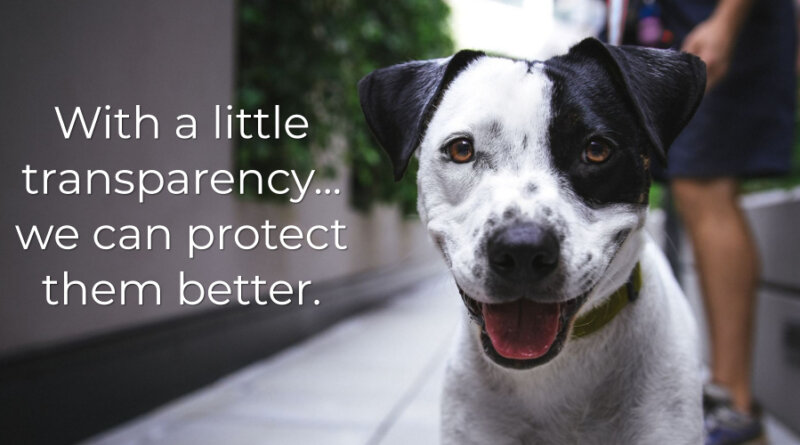What We Aren’t Being Told On Labels And In Recall Notices – Truth about Pet Food
In 2021 three different companies recalled pet food for excess levels of vitamin D.
In mid-August Simply Nourish pet food recalled a frozen dog food.
Two months later – on October 4, 2021 – Fromm recalled a canned dog food.
And a week and a half following that, NutriSource Pure Vita recalled a wet (shelf stable) dog food too.
All 3 recalls were for excess levels of vitamin D, a cause that could result in a deadly outcome for dogs consuming these pet foods.
What’s happening? After a massive excess vitamin D recall from Hill’s Pet Food in early 2019, and multiple brands made by Sunshine Mills recalled for the same cause in late 2018 – why are we seeing excess vitamin D recalls again in 2021?
One possibility is lack of test and hold protocols.
With certainty we know that these three companies did not test their pet foods prior to shipping them out to retailers/distributors even though two of the three recall notices claimed safety measures caught the problem.
Simply Nourish’s recall notice stated: “The recall was initiated after a routine nutrition test confirmed elevated Vitamin D levels on certain Simply Nourish frozen food products.”
Fromm’s recall notice stated: “The recall was initiated after we discovered, through our own analysis, that these products may contain elevated levels of Vitamin D.”
And NutriSource’s recall notice blamed the co-packer of the pet food: “The recall was initiated after Tuffy’s was notified by the product manufacturer that this product may contain elevated levels of vitamin D.“
Some pet food companies have in place a ‘test and hold’ program for their pet foods. Batches of pet foods are tested, BUT held in storage until test results are received. This prevents a possible dangerous pet food from being distributed to pet owners and prevents the manufacturer from recalling.
Unfortunately, not all pet food manufacturers have a test and hold protocol in place. Performing tests on pet foods AFTER they have been distributed to pet stores doesn’t prevent pets from becoming ill or dying.
Another possibility is improperly formulated vitamin premix.
Most pet foods provide dogs and cats ‘complete nutrition’ through supplements. And most pet foods purchase bulk supplements in a “pre-mix”. Trouw Nutrition explains a ‘pre-mix’ as:
“The Association of American Feed Control Officials (AAFCO) sets specific nutrient minimums and maximums for both cats and dogs, which vary by life stage. Delivered at such precise and small quantities, vitamins and trace minerals can be cumbersome to weigh and measure and challenging to disperse equally throughout the pet food.”
“A premix is a fairly potent mixture of vitamins, trace minerals or a combination of both, designed to provide those micronutrients to the pet food. The addition rate is typically 1-10 lbs/ton. The components in a premix include:
- Actives: Required vitamins and/or trace minerals
- Carriers: Used to properly disperse actives and limit ingredient segregation. Rice hulls or pea fiber, for grain-free foods, are the most common carriers.
- Densifier: Used to achieve a target bulk density. Most commonly this is calcium carbonate.
- Dust suppressant: Used to limit dust associated with the active ingredients and hold the carrier and actives together, while also serving as a dust suppressant to improve work safety. Most commonly this is a small amount of vegetable oil.“
If the vitamin pre-mix was not formulated properly, the pre-mix could adulterate any pet food it was added to. And if a test and hold protocol was not in place at the pre-mix manufacturing facility, an improperly formulated/adulterated pre-mix could be shipped to manufacturers. If the pet food manufacturer did not test the pre-mix prior to using it and did not test and hold the finished batches of pet food, adulterated pet food would be the result.
Another possibility is poor trace forward and trace backward investigation by regulatory authorities.
All three of these recalls were for a cooked/wet dog food, which could indicate the pre-mix was the same for all three pet food brands – perhaps the same pre-mix supplier for all three brands.
The first recall occurred in mid-August 2021. Pet food manufacturers are required to notify FDA within 24 hours of their awareness of a pet food problem. At that point regulatory would investigate the pet food plant performing a trace forward and trace backwards investigation. Trace forward is to determine where the pet foods were distributed, to assure all retailers and distributors were notified of the recall. Trace backwards is to determine the supplier of the adulterated pre-mix and to determine exactly what batches of pet food included the adulterated pre-mix.
Once the supplier of the adulterated pre-mix is determined, it is typical for regulatory to perform a trace forward and trace backwards investigation at the supplier with the goal of determining what other pet food brands received the adulterated pre-mix.
The second recall occurred two months AFTER the initial recall. The third recall occurred less than two weeks after the second recall. Because the second and third excess vitamin D recalls occurred close together, it could be both of these foods were manufactured by the same company. Tracing of an adulterated pre-mix should be relatively easy to do IF the pet foods were made by the same co-packer.
But…if all three of these recalls are linked to an adulterated vitamin pre-mix, made by the same pre-mix supplier – this would tell us it took regulatory authorities almost 2 months to trace a very dangerous adulterated pet food pre-mix. A huge investigation failure that easily could have cost pets their lives.
Or it could be all of the above. These three recalls could be the result of lax testing procedures at the manufacturing level of both the pre-mix supplier and the pet food manufacturers and also a failed regulatory investigation. The problem – part of the problem – is pet owners aren’t told anything that could help them in instances like this.
We are not told exactly who manufactures (the co-packer of) every pet food, that information should be required to be included on the label. And recall notices don’t disclose the name of a co-packer (if involved). If this information was provided, pet owners would be given a heads up should the co-packer issue a recall of another brand. Without being given this pertinent information, pets and pet owners are at the mercy of a very slow regulatory investigation process.
Recall notices should be required to disclose not only the cause of a recall (such as excess vitamin D), but the source of the cause (such as a vitamin pre-mix). Suppliers of the adulterated ingredient should be required to publicly release a complete list of manufacturers they sold the adulterated ingredient to.
Recall trace forward and trace backwards investigation documents should be publicly available on the FDA website as soon as they are written. These investigation documents often contain alarming information about a manufacturers failed procedures – information we deserve to know. Currently any pet owner wanting to learn about a regulatory investigation of a pet food would have to file a Freedom of Information Act request for the documents which could take 2 years or more to receive.
With transparency, pet owners would be in a much better position to protect our pets. So…we sent the following letter/email to FDA Center for Veterinary Medicine asking for changes in recall procedures.
FDA Center for Veterinary Medicine
Attention: Dr. Steven Solomon Director
On behalf of pet food consumers, Association for Truth in Pet Food and TruthaboutPetFood.com is requesting some much needed reform for pet food labels and recall notices.
As background to our request, from mid-August 2021 to mid-October 2021 three different brands of wet dog food were recalled for excess vitamin D. As you are aware, pet foods that include excessive levels of vitamin D are very dangerous to the pet consuming them.
The style of pet foods recalled – all wet dog food – seems to indicate these recalls were linked by either the same co-packer or the same pre-mix supplier. Unfortunately pet owners aren’t provided any confirmation of this with existing labels and existing recall notices. Therefore we suggest the following requirements to recall notices and pet food labels:
- Pet food labels be required to disclose co-packer name;
- Recall notices be required to disclose the actual manufacturer (co-packer if applicable) of a recalled food and the source of the adulteration (such as an adulterated pre-mix).
Using the three excess vitamin D recalls of 2021 as example to how these changes could benefit pet owners…
Had the Simply Nourish recall notice of mid-August included the co-packer information, and all pet food labels include co-packer information – pet owners could quickly determine if their pet’s food was made by the same co-packer and potentially be at risk of including excess vitamin D. With pertinent manufacturing information disclosed on labels and recall notices – pet owners could take prompt action to potentially save their pets lives instead of waiting two months for tracing of an adulterated pre-mix that resulted in two subsequent recalls.
We also request FDA to publicly post all recall investigation documents on the agency website. Currently any pet owner wishing to learn details of a recall investigation would have to file a FOIA request which currently takes 24 months or more to receive.
With this type of manufacturing transparency, pet owners will be empowered to better protect their pets from an adulterated pet food.
Please provide us your response to this request. Thank you –
Susan Thixton
Should any pet owner wish to send FDA CVM their comments on the above, you can email them at AskCVM@fda.hhs.gov. And if Dr. Solomon responds to our email, it will be shared.
Wishing you and your pet(s) the best,
Susan Thixton
Pet Food Safety Advocate
Author Buyer Beware, Co-Author Dinner PAWsible
TruthaboutPetFood.com
Association for Truth in Pet Food

Become a member of our pet food consumer Association. Association for Truth in Pet Food is a stakeholder organization representing the voice of pet food consumers at AAFCO and with FDA. Your membership helps representatives attend meetings and voice consumer concerns with regulatory authorities. Click Here to learn more.
What’s in Your Pet’s Food?
Is your dog or cat eating risk ingredients? Chinese imports? Petsumer Report tells the ‘rest of the story’ on over 5,000 cat foods, dog foods, and pet treats. 30 Day Satisfaction Guarantee. Click Here to preview Petsumer Report. www.PetsumerReport.com
Find Healthy Pet Foods in Your Area Click Here

The 2021 List
Susan’s List of pet foods trusted to give her own pets. Click Here to learn more.





The rise of eco-friendly online stores is motivating sustainable shopping habits. Online Shopping
It’s appropriate time to make some plans for the future and it is
time to be happy. I’ve read this post and if I could I desire to
suggest you few interesting things or tips. Maybe you can write next articles referring to this article.
I desire to read even more things about it!
Wow, that’s what I was exploring for, what a information! existing here at this weblog, thanks admin of this web site.|